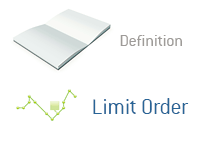Definition of Limit Order
What does the term "limit order" mean as it applies to the stock market? What is meant by a "limit order"?
A limit order is an order in which you are specifying the maximum price you will pay (or minimum price if you are shorting) for a stock.
 For instance - let's say that Microsoft is currently trading at $25 per share and you want to buy some shares. However, you believe that shares are going to pull back, so you put in a limit order to buy 100 shares at $24. Since Microsoft is trading at $25/share, your order will not immediately fire - instead, the order will execute once shares of Microsoft trade down to $24. As soon as this happens, your limit order will turn into a market order and your order will be executed at the best available price.
For instance - let's say that Microsoft is currently trading at $25 per share and you want to buy some shares. However, you believe that shares are going to pull back, so you put in a limit order to buy 100 shares at $24. Since Microsoft is trading at $25/share, your order will not immediately fire - instead, the order will execute once shares of Microsoft trade down to $24. As soon as this happens, your limit order will turn into a market order and your order will be executed at the best available price. In the case of a short (where you bet against a stock), you can set a limit order at which you specify the lowest amount that you would short a stock.
For instance - let's say that you wanted to short XYZ at no lower than $23 per share. You could enter your limit order at $23. If the stock was trading at $22.50, your order would not execute. However, if the stock was trading at $23.50, your order would immediately execute.
It's important to note that you can end up paying more than you originally anticipated with a limit order.
For instance, let's say that you set a $5 limit order on a stock that is quickly rising in price. The stock is trading at $4.90 when you set your order, which means that your order immediately fires and turns into a market order.
Due to the stock moving so fast, you end up getting filled at $5.10 per share, as your market order was executed at the best available price.
--
Davemanuel.com Articles That Mention Limit Order:
More Stock Market Terms Explained: Limit Orders, Market Orders and Stop Losses
